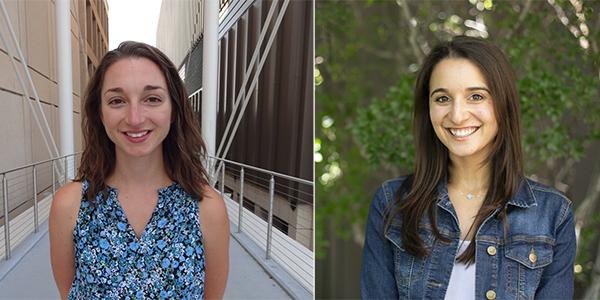Moody Graduate Student Spotlight: Robyn Croft and Katie Winters
Published Fall 2021
Robyn Croft and Katie Winters are doctoral students and certified speech and language pathologists in the Speech, Language, and Hearing Department. Croft and Winters work under the mentorship of Dr. Courtney Byrd in the Arthur N. Blank Stuttering Institute. These interviews have been condensed and edited.
Katie Winters and Robyn Croft

How does the research that you’re doing for the Stuttering Institute intersect with your teaching in the classroom?
KW: I study factors that contribute to overall quality of life in adults who stutter. My dissertation is looking at social stress and social anxiety, factors that protect adults from the negative impact of social stress, and what adults who stutter can do to be more resilient to social stress. Some of my interests involved self-compassion and just how to improve overall quality of life.
What I have learned from my mentor is to really put people who stutter at the forefront of guiding us and listening to their voices in terms of guiding and deciding what we should research. If what we're researching is not relevant for their lives, then, what are we doing? Picking things that are clinically relevant means listening to people who stutter.
In the same sense, within teaching I listen to my students in terms of what is helping them learn and what is challenging and, as much as I can, adapting or tailoring my teaching style to how they learn best. That requires that I listen and that I give them an opportunity to share what is most effective for them.
How has your teaching changed since the first time you taught your own class to now?
RC: I think I had elements of this when I started teaching, but the more I do it, the more I find it to be the case: Hands-on practice and experiential learning tends to be the most helpful. Students appreciate having a real-life application of what we're learning. Whether it's theoretical or more practical, being able to apply it in some way to a real clinical case can be really motivating to students.
Perhaps the biggest change partly came from participating in the Inclusive Teaching Seminar that Mirza [Lugo-Neris] and Liberty [Hamilton] were running insert link to previous Spotlight here!. We talked a lot there, and I’ve seen it in my own professors who I admire most, about this idea of bringing your whole self to the classroom. At the beginning, I was a little more hesitant to do that because it requires you to be vulnerable to bring your whole self, or to share things that are relevant to the material, but also perhaps personal to you, whether it's about your own background or cultural influences. Over time, I think I have pushed myself to become more comfortable doing that because it sets the tone for the class. It creates trust, and it can help to make learning more meaningful and more personal for the students.
Do you have any advice for graduate students who are just starting out as instructors?
We’re in a really unique position because it's one of those rare times where we're wearing both hats. We're both the student and we’re the instructor—so use that as your superpower. Use that as a window into what your students are experiencing and use that insight into what has been helpful for you as a student. Discard what hasn't been helpful and because you're living that as you're teaching you have this unique insight that not every instructor has so that's what I would say is just to use your dual role to put yourself in your students’ shoes.

